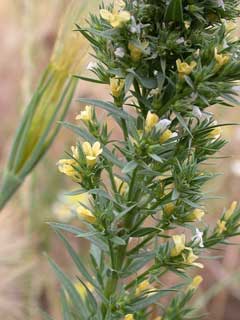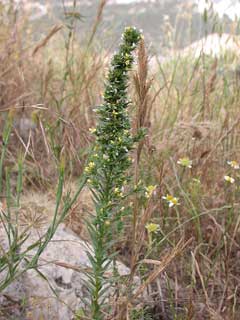 |
|
http://commons.wikimedia.org/wiki/User:Gidip |
 |
| http://commons.wikimedia.org/wiki/User:Gidip |
Translate this page:
Summary
Physical Characteristics

 Linum strictum is a ANNUAL growing to 0.4 m (1ft 4in).
Linum strictum is a ANNUAL growing to 0.4 m (1ft 4in).
See above for USDA hardiness. It is hardy to UK zone 6. The species is hermaphrodite (has both male and female organs) and is pollinated by Insects.
Suitable for: light (sandy) and medium (loamy) soils, prefers well-drained soil and can grow in nutritionally poor soil. Suitable pH: mildly acid, neutral and basic (mildly alkaline) soils. It cannot grow in the shade. It prefers dry or moist soil.
UK Hardiness Map
US Hardiness Map
Synonyms
Plant Habitats
Cultivated Beds;
Edible Uses
References More on Edible Uses
Medicinal Uses
Plants For A Future can not take any responsibility for any adverse effects from the use of plants. Always seek advice from a professional before using a plant medicinally.
Emollient
The seeds are used as an emollient[240].
References More on Medicinal Uses
The Bookshop: Edible Plant Books
Our Latest books on Perennial Plants For Food Forests and Permaculture Gardens in paperback or digital formats.

Edible Tropical Plants
Food Forest Plants for Hotter Conditions: 250+ Plants For Tropical Food Forests & Permaculture Gardens.
More

Edible Temperate Plants
Plants for Your Food Forest: 500 Plants for Temperate Food Forests & Permaculture Gardens.
More

More Books
PFAF have eight books available in paperback and digital formats. Browse the shop for more information.
Shop Now
Other Uses
References More on Other Uses
Cultivation details
Prefers a light well-drained moderately fertile humus-rich soil in a sunny sheltered position[200].
References Carbon Farming Information and Carbon Sequestration Information
Temperature Converter
Type a value in the Celsius field to convert the value to Fahrenheit:
Fahrenheit:
The PFAF Bookshop
Plants For A Future have a number of books available in paperback and digital form. Book titles include Edible Plants, Edible Perennials, Edible Trees,Edible Shrubs, Woodland Gardening, and Temperate Food Forest Plants. Our new book is Food Forest Plants For Hotter Conditions (Tropical and Sub-Tropical).
Shop Now
Plant Propagation
Seed - sow early spring in situ.
Other Names
If available other names are mentioned here
Native Range
TEMPERATE ASIA: Iran, Iraq, Israel, Jordan, Lebanon, Syria, Turkey TROPICAL ASIA: Pakistan EUROPE: Former Yugoslavia, Albania, Bulgaria, Greece (incl. Crete), Italy (incl. Sardinia, Sicily), Spain (incl. Baleares), France (incl. Corsica), Portugal AFRICA: Spain (Canarias), Portugal (Madeira Islands), Algeria, Egypt, Libya, Morocco, Tunisia, Ethiopia
Weed Potential
Right plant wrong place. We are currently updating this section.
Please note that a plant may be invasive in one area but may not in your area so it's worth checking.
Conservation Status
IUCN Red List of Threatened Plants Status :

| Related Plants
|
| Latin Name | Common Name | Habit | Height | Hardiness | Growth | Soil | Shade | Moisture | Edible | Medicinal | Other |
| Allium pendulinum | | Bulb | 0.3 |
-
| | LM | S | M | 3 | 2 | 1 |
| Apium graveolens secalinum | Leaf Celery | Biennial | 0.6 |
-
| | LM | SN | M | 4 | 2 | 2 |
| Conioselinum pacificum | Pacific Hemlock-Parsley | Perennial | 0.0 |
-
| | LM | N | M | 2 | 1 | |
| Conioselinum vaginatum | | Perennial | 0.8 |
-
| | LMH | SN | M | 0 | 1 | |
| Gymnanthemum amygdalinum | Bitterleaf | Shrub | 8.0 |
10-12
| M | LMH | N | DM | 4 | 3 | 2 |
| Lilium pardalinum | Panther Lily, Leopard lily, Pitkin Marsh lily, Vollmer's lilyShasta lily, Wiggins' lily | Bulb | 2.0 |
5-9
| M | LMH | SN | MWe | 2 | 0 | 2 |
| Linum bienne | Pale Flax | Annual/Perennial | 0.6 |
6-9
| | LM | N | M | 0 | 0 | 2 |
| Linum catharticum | Purging Flax, Fairy flax | Annual | 0.3 |
0-0
| | LM | N | M | 0 | 2 | |
| Linum crepitans | | Annual | 0.6 |
-
| | LM | N | M | 0 | 0 | 1 |
| Linum humile | | Annual | 0.6 |
-
| | LM | N | M | 1 | 0 | 1 |
| Linum hybrids | Perennial Flax | Perennial | 0.8 |
7-11
| F | LMH | N | M | 4 | 4 | 4 |
| Linum marginale | Native Flax | Perennial | 0.6 |
-
| | LM | N | M | 1 | 0 | 1 |
| Linum monogynum | | Perennial | 0.6 |
7-10
| | LM | N | M | 0 | 0 | 1 |
| Linum perenne | Perennial Flax, Blue flax, Alpine flax | Perennial | 0.3 |
5-9
| M | LM | N | DM | 3 | 2 | 3 |
| Linum usitatissimum | Flax, Common flax | Annual | 0.7 |
4-8
| | LM | N | M | 4 | 3 | 4 |
| Mesembryanthemum crystallinum | Ice Plant, Common iceplant | Perennial | 0.1 |
8-11
| | LMH | N | DM | 3 | 1 | 1 |
| Pedicularis sceptrum carolinum | Lousewort | Perennial | 1.2 |
-
| | LMH | SN | M | 1 | 1 | |
| Petroselinum crispum | Parsley | Biennial | 0.6 |
4-9
| M | LMH | SN | M | 4 | 4 | 3 |
| Petroselinum crispum tuberosum | Hamburg Parsley | Biennial | 0.6 |
6-9
| | LMH | SN | M | 4 | 3 | 3 |
| Petroselinum segetum | Corn Caraway | Biennial | 1.0 |
-
| | LMH | SN | M | 1 | 0 | |
| Peucedanum oreoselinum | | Perennial | 1.0 |
4-8
| | LMH | N | M | 0 | 1 | 1 |
| Pteridium aquilinum | Bracken, Western brackenfern, Decomposition brackenfern, Hairy brackenfern | Fern | 1.2 |
4-7
| F | LMH | SN | DM | 2 | 2 | 3 |
| Pteridium aquilinum esculentum | Bracken | Fern | 1.2 |
4-8
| | LMH | SN | DM | 2 | 2 | 3 |
| Talinum aurantiacum | Orange Flameflower | Perennial | 0.4 |
-
| | LMH | SN | M | 1 | 0 | |
| Talinum fruticosum | Tahitian Spinach, Waterleaf, Ceylon Spinach | Perennial | 0.5 |
8-11
| F | LMH | SN | DM | 3 | 2 | 1 |
| Thalictrum collinum | Lesser meadow-rue | Perennial | 0.0 |
0-0
| | LMH | SN | M | 0 | 1 | 0 |
|
Growth: S = slow M = medium F = fast. Soil: L = light (sandy) M = medium H = heavy (clay). pH: A = acid N = neutral B = basic (alkaline). Shade: F = full shade S = semi-shade N = no shade. Moisture: D = dry M = Moist We = wet Wa = water.
Now available:
Food Forest Plants for Mediterranean Conditions
350+ Perennial Plants For Mediterranean and Drier Food Forests and Permaculture Gardens.
[Paperback and eBook]
This is the third in Plants For A Future's series of plant guides for food forests tailored to
specific climate zones. Following volumes on temperate and tropical ecosystems, this book focuses
on species suited to Mediterranean conditions—regions with hot, dry summers and cool, wet winters,
often facing the added challenge of climate change.
Read More
Expert comment
Author
L.
Botanical References
200
Links / References
For a list of references used on this page please go here
Readers comment
| Add a comment |
|
If you have important information about this plant that may help other users please add a comment or link below. Only comments or links that are felt to be directly relevant to a plant will be included. If you think a comment/link or information contained on this page is inaccurate or misleading we would welcome your feedback at [email protected]. If you have questions about a plant please use the Forum on this website as we do not have the resources to answer questions ourselves.
* Please note: the comments by website users are not necessarily those held by PFAF and may give misleading or inaccurate information.
To leave a comment please Register or login here All comments need to be approved so will not appear immediately.
|
|